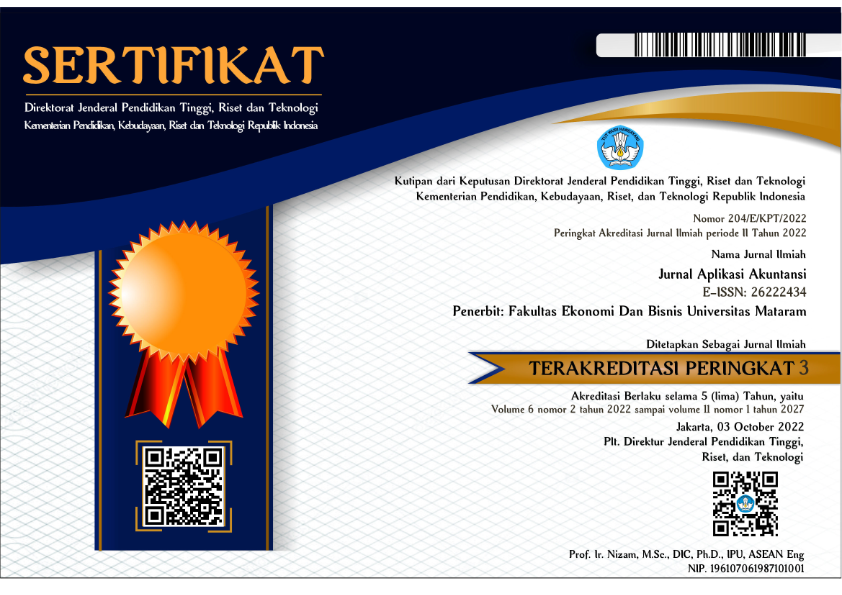MANAJEMEN LABA DAN KONSEKUENSI EKONOMIS (SUATU PENDEKATAN EKSPERIMEN)
DOI:
https://doi.org/10.29303/jaa.v4i1.60Keywords:
earning management;, accounting methodes, experimental approaches, ethical behaviorAbstract
Earnings management can be seen as a discretion allowed by generally accepted Standards, but it also has a less positive impact if earnings that contain certain objectives of the manager (management) become the basis in economic decision making. However, earnings management does not have to be associated with efforts to manipulate accounting data or information, but tends to be associated with choosing accounting methods to manage earnings that can be done because it is permitted by accounting standards. This study is focused on looking at the two sides of earnings management by using an experimental approach and the economic consequences caused by the chosen perspective. The results of data processing indicate that participants' perceptions of ethical and unethical behavior towards earnings management practices are the same as the economic consequences for the organization.
References
Dechow, Patricia M., dan Douglas J. Skinner. 2000. Earning Managements : Reconciling the Views of Accounting Academics, Practitioners, and Regulators. Accounting Horizons, Vol. 14 No. 2. Juni 2000.
Elias, R. 2002. Determinants of earnings management ethics among accountants. Journal of Business Ethics 40 (1): 33�45.
Gumanti, Tatang Ary, 2000. Earnings Management : Suatu Telaah Pustaka. Jurnal Akuntansi dan Keuangan Vol. 2, No. 2. Nopember 2000.
Hunt, S., dan S. Vitell. 1986. A general theory of marketing ethics. Journal of Macromarketing 6 (1): 5�16.
Jensen, M.C., and W. H. Meckling. 1976. Theory of The Firm: Manajerial Behaviour, Agency Cost, and Ownership Structure. Journal of Financial and Economics, 3, 305-360.
Jones, T. 1991. Ethical decision making by individuals in organizations: An issue contingent model. Academy of Management Review 16 (2): 366�395.
Johnson, E., G. M. Fleischman, S. Valentine, dan K. B. Walker. 2011. Manager?s ethical evaluations of earnings management and its consequences. Working Paper. SSRN.
Haryani, Linggar Pratiwi, dan Muchamad Safruddin. 2011. Pengaruh mekanisme Corporate Governance terhadap kinerja : transparansi sebagai variabel intervening. Prosiding Simposium Nasional Akuntansi IV, Aceh, 2011.
Holmstrom, Bengt. 1979. Moral Hazard and Observability. The Bell Journal of Economics. Vol. 10 No. 1. 74-91.
Kaplan, S. 2001. Further evidence on the ethics of managing earnings: An examination of the ethically related judgments of shareholders and non-shareholders. Journal of Accounting and Public Policy 20 (1): 27�44.
Lasdi, Lodovicus. (2012). Studi Eksperimen Evaluasi Etis Manajer terhadap Manajemen Laba dan Konsekuensinya. SNA Akuntansi Unikal. 2012.
Mubarok, Abdulloh dan Yuni Utami. (2012). Persepsi Profesi Akuntan terhada Penerapan Manajemen Laba.
Download.portalgaruda.org/article.php?article=116975&val=5330. Di unduh tanggal 10 Maret 2018.
Rest, J. 1986. Moral Development: Advances in Research and Theory. New York: Praeger.
Ronen, J., and V. Yaari. 2008. Earnings Management: Emerging Insights in Theory, Practice, and Research. New York: Springer.
Seal, Will, 2006. Management Accounting and corporate governance : An institutional interpretation of the agency problem. Management Accounting Research, UK, 2006.
Shleifer, A. and R.W. Vishny. 1997. A Survey of Corporate Governance. Journal of Finance, Vol.52. No.2. June, p.737-783.
Sulistyanto, Sri. 2008. Manajemen Laba : Teori dan Model Empiris. Jakarta : PT. Gramedia Widiasarana Indonesia.
Watts, R., and J.L. Zimmerman. 1990. Positive Accounting Theory. The Accounting Review. Vol 65, No. 1.
Whelan, Catherine J., dan Raymond P. McNamara. 2004. The Impact of Earnings Management on the Value-Relevance of Earnings and Book Value : A Comparison of Short-term and Long-term Discretionary Accruals. JEL Classifications : G12, G14, and M41.









